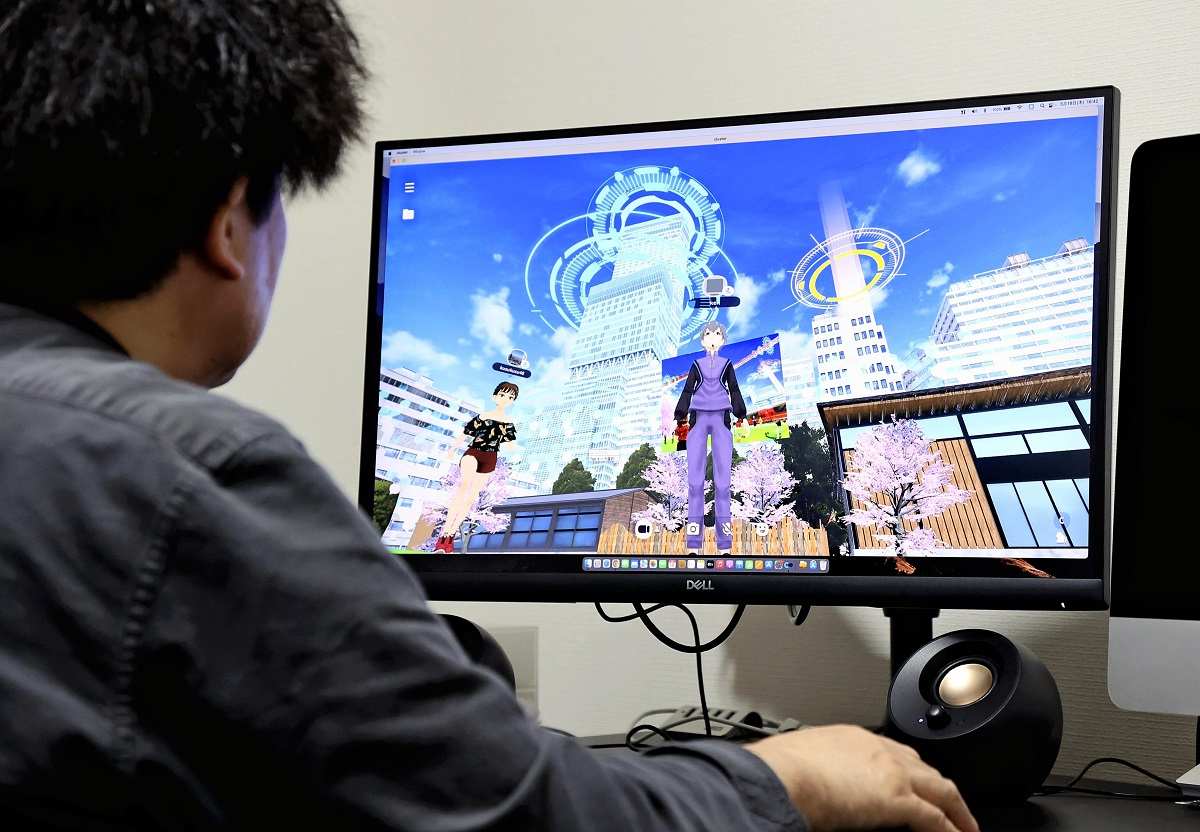
The reporter visits a virtual Abeno Harukas in the metaverse.
13:00 JST, July 27, 2023
Metaverse platforms are slowly but surely growing in popularity. The platforms’ virtual worlds allow users to wander around internet-based spaces such as towns or cities in the form of an avatar — or online alter ego — participate in events, and interact with others.
I recently dipped a tentative toe into this fascinating world, which I had heard about, but never encountered first-hand.
The term “metaverse” is a portmanteau of “meta” and “universe.” The concept of the metaverse first came to attention in American sci-fi writer Neil Stephenson’s 1992 novel “Snow Crash.” In the book, Stephenson describes a virtual realm where the protagonist wears virtual reality (VR) goggles in a “computer-generated universe.” The author writes, “In the lingo, this imaginary place is known as the Metaverse.”
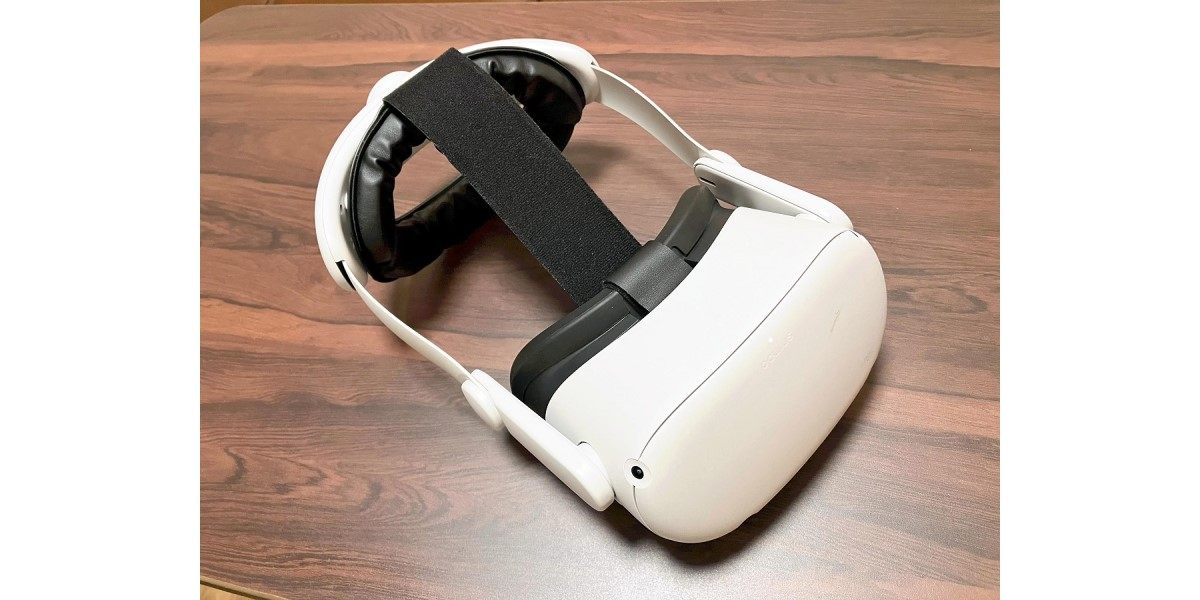
A virtual reality (VR) goggle
Instant Osaka
Wearing special goggles is one way to participate in metaverse-based worlds, but computers and smartphones can be used for certain services, too.
One way to do so is through a metaverse service platform called “cluster,” provided by Tokyo-based Cluster, Inc. I downloaded the app to my PC, registered as a user and entered the free-to-use space.
After selecting an avatar, I clicked on an option offering a “virtual Shibuya.” Instantly, an image reproducing the streets of night-time Shibuya appeared on the screen. I found myself — or rather, my avatar found itself — at the Shibuya scramble crossing in front of Shibuya Station. Some 550,000 reportedly people visited the virtual crossing during a 16-day event in 2021 event titled “Halloween Fes.” However, when I logged in, I was the only presence there.
I was able to my avatar around using the mouse and computer keys. After looking around for a while, I decided to relocate to a virtual Abeno Harukas in Osaka. The move was instant.
Using a microphone, I said “hello” to an avatar that moved past me, but it soon went away.
I encountered a large number of avatars in the “lobby,” which serves as the entrance to the cluster. I could hear some talking, but most moved around alone in silence.
One user, a 30-year-old office worker from Chiba Prefecture, said he started using the metaverse in March last year while staying home during the coronavirus pandemic. “I can travel vast distances with worrying about the time,” he said. “I feel very free.”
There are various metaverse spaces — including realms that re-create landscapes in Japan and overseas, and fantasy worlds created by users — but the office worker said he prefers places where he can spend time alone.
As I’m also something of a loner, I think I understand how he feels.
It was fun looking at buildings and cities from different angles. I got a kick out of climbing to the top of the virtual Nakagin Capsule Tower in Ginza, Tokyo, a now defunct building.
Events also take place in the metaverse, including live concerts and drinking parties. According to Cluster, Inc., park-based radio calisthenics are popular, too.
Easy ascent
Intrigued, I decided to explore other services. In March, Kotohira Bus Co. in Kotohira, Kagawa Prefecture, organized a “virtual walking tour” of the town. Kotohira sits near Takamatsu City, where I work. I was offered the opportunity to experience the tour on my computer after the main event had finished.
My avatar walked along the approach to Konpira-gu shrine, known as “Konpira-san.” I happily ascended the shrine’s 1,368 stone steps without difficulty. In the real world, I usually hesitate to climb the stairs because I quickly become short of breath.
“Using the metaverse, people in distant locations come here as often as they want,” said Kotohira Bus Co. President Taijiro Kusunoki. The firm hopes to promote and increase exchanges even during such times as a pandemic.
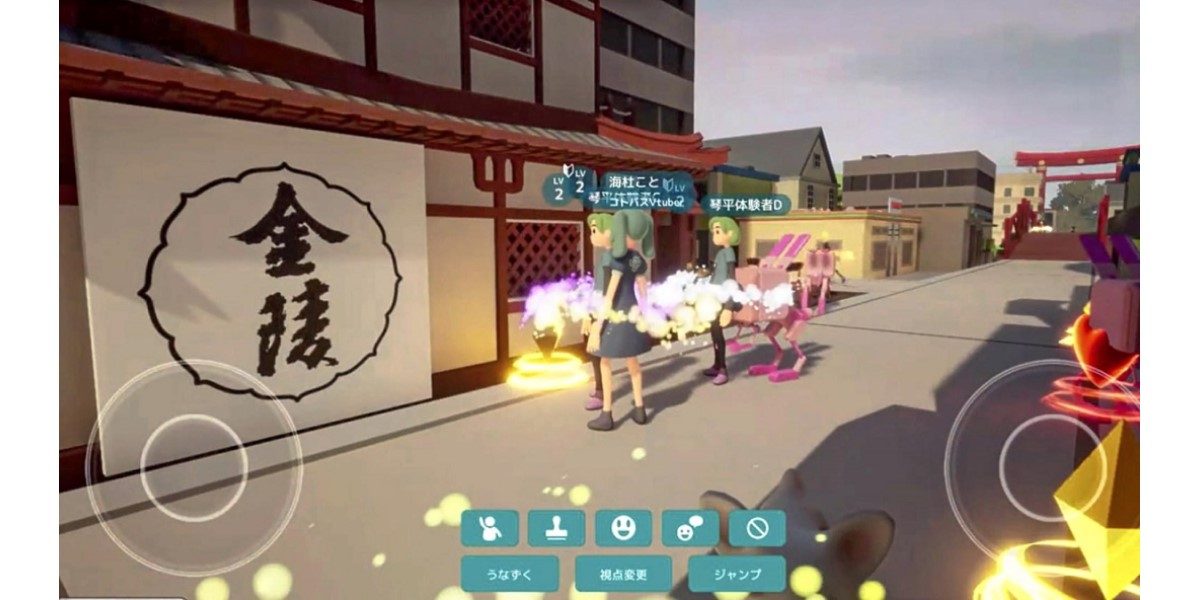
A scene from the “virtual town-walking tour” organized by Kotohira Bus Co.
Hitting the stage
In May, “Karaoke Manekineko” launched its “Meta Kara” — a VR karaoke service that allows users to sing on a stage. The service is available at a total of six shops in Tokyo, Sapporo, Yokohama, Osaka and Hakata City in Fukuoka.
After selecting an avatar, customers can choose from nine stage-location options, including outdoors, the beach and the surface of the moon. I chose a song, donned VR goggles and found myself standing on stage. While moving my head, I could see the lyrics on a monitor on the virtual stage. With silhouetted audience members jumping up and down while pumping their fists in the air, it felt very realistic and I could not help myself from belting out the song enthusiastically.
“Please enjoy our extraordinary space,” said a representative of Koshidaka Co., which operates the karaoke shops. To use the service, customers pay a regular room charge plus ¥1,500 for two hours. A special unlimited-time service is available for ¥1,000 through Aug. 31.
Leading telecomms provider, KDDI Corp., plans to launch a service this summer that allows customers to view and buy products in a metaverse featuring real world-branded stores. According to an Internal Affairs and
Communications Ministry white paper on information and communications, global sales in the metaverse are expected to grow to ¥78 trillion by 2030.
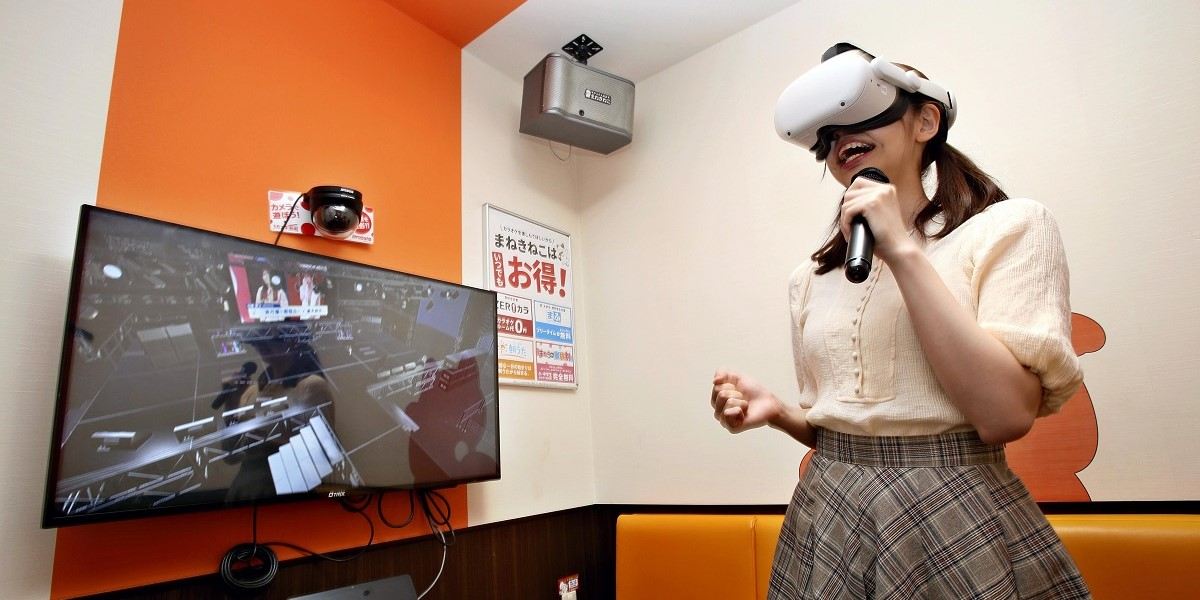
Wearing goggles, a woman uses the Mata Kara service that allows users to sing on a stage in a virtual space.
Be whoever you want to be
The number of people using metaverse platforms increased drastically from around 2020, according to Virtual Bishojo Nemu, a virtual idol and author of “Metaverse Shinkaron” (Theory of metaverse evolution), published by Gijutsu-Hyoron Co. The emergence of relatively inexpensive VR goggles during the coronavirus pandemic seems to have been a driving force behind this surge in popularity.
Nemu says the charm of the metaverse lies in the fact that users can transform themselves into anyone they want. In the real world, people adopt various “faces,” depending on whether they are at home, at work or with friends. “[As an avatar] you can choose from among these various ‘faces,’ and discover who you really want to be and how you want to feel,” Nemu opined.
Nemu also offered some advice for first-time metaverse users: “Initially, please only play for a short period because, prolonged initial use can make your feel nauseous. I’d recommend searching out events geared toward beginners and ask metaverse ‘residents’ to teach you how to enjoy and conduct yourself.”
Hidenori Tomita, a professor of information media theory at Kansai University, has been holding metaverse-based classroom seminars since April last year.
Tomita said he was surprised to observe students who were normally quiet in the real-world willingly speaking up as avatars, apparently because they “don’t have to worry about how others look at them.”
“I think there are realms in which metaverse-based communications can be effective, such as business and education,” Tomita said.
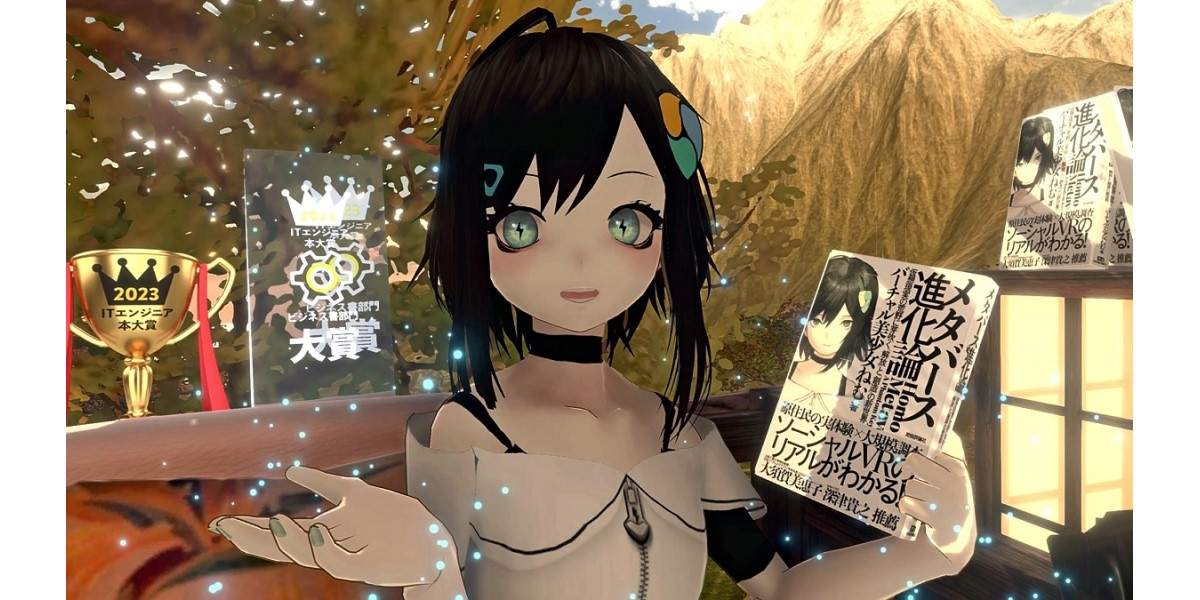
The reporter interviews Virtual Bishojo Nemu in a metaverse space.
Top Articles in JN Specialities
-

Tokyo University of the Arts Now Offering Free Guided Tour of New Storage Building, Completed in 2024
-

Exhibition Shows Keene’s Interactions with Showa-Era Writers in Tokyo, Features Newspaper Columns, Related Materials
-

Step Back in Time at Historical Estate Renovated into a Commercial Complex in Tokyo
-

The Japan News / Weekly Edition (1/30-2/5)
-
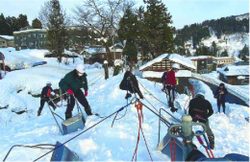
Prevent Accidents When Removing Snow from Roofs; Always Use Proper Gear and Follow Safety Precautions
JN ACCESS RANKING
-

Japan PM Takaichi’s Cabinet Resigns en Masse
-

Japan Institute to Use Domestic Commercial Optical Lattice Clock to Set Japan Standard Time
-

Israeli Ambassador to Japan Speaks about Japan’s Role in the Reconstruction of Gaza
-

Man Infected with Measles Reportedly Dined at Restaurant in Tokyo Station
-

Videos Plagiarized, Reposted with False Subtitles Claiming ‘Ryukyu Belongs to China’; Anti-China False Information Also Posted in Japan






















